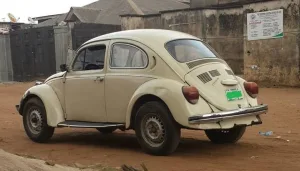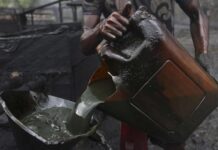There was a time in this country when people drove locally manufactured cars and nobody was interested in ‘tokunbo’
Those days you could tell seem like ages ago because nobody thinks again about buying locally made vehicles in Nigeria.
The reason is that those companies locally manufacturing vehicles have since left the country.

If you are wondering how Nigeria became a dumping ground for used cars, well do not wonder much.
Because some good and bad decisions we made got us here.
You see history has it that Nigeria was locally manufacturing its own vehicles around the 1970’s
This was made possible by a joint venture partnership with some countries of the world.
These countries include America, Germany, France, and the UK to bring in world-class makers of fuel-powered vehicle parts to Nigeria.
Have You Read: Nigerian Air Force Officers Storm EFCC Office Over Colleagues’ Arrest
It was this plan that led to the establishment of Six vehicle assembly plants following the oil boom of the 1970s.
Local Vehicle Assembly Plant In Existence Around The 1970’s
- National Truck Manufacturers, Kano
- Volkswagen of Nigeria Limited, Lagos
- Peugeot Automobile Nigeria Limited, Kaduna
- Anambra Motor Manufacturing Limited, Enugu
- Leyland Nigeria Limited, Ibadan
- Steyr Nigeria Limited, Bauchi
The Sector Boomed As Demand Was High
That partnership included subsidies on imported car parts to encourage these foreign experts.
It is safe to say that the government at this time invested more in the Auto Industry to enhance movement.
The companies were producing about 100 units of vehicles per day because the demand was high
These plants produced the popular cars of the 1970s – 1980s and also left a trace in some of the vehicles we use today.
Cars produced include Peugeot 504, 505, and other Volkswagen products like Beetle, Jett, Golf, and Passat.
Others are the Kombi bus which later became the Danfo that we know on Lagos roads today.
Why Things Went Sour
The shortfall in oil prices of 1989 affected Nigeria.
Since crude oil contributed majorly to the national treasury, demand for auto products fell and some firms were forced out of the market.
After that unexpected and sad twist, Nigeria tried to remedy the situation by increasing charges on import duties so as to meet up.
You May Also Like: Cassie Files Lawsuit Against Diddy, Lays Rape Accusation
That move backfired as the cost of production went up, and suppliers were not able to meet with demand from buyers due to the increased cost of production.
When it continued that way, people resorted to Tokunbo cars which became cheaper than Made-in-Nigerian cars and that was how we got to where we are today.
Now you know how Tokunbo cars became the order of the day.






